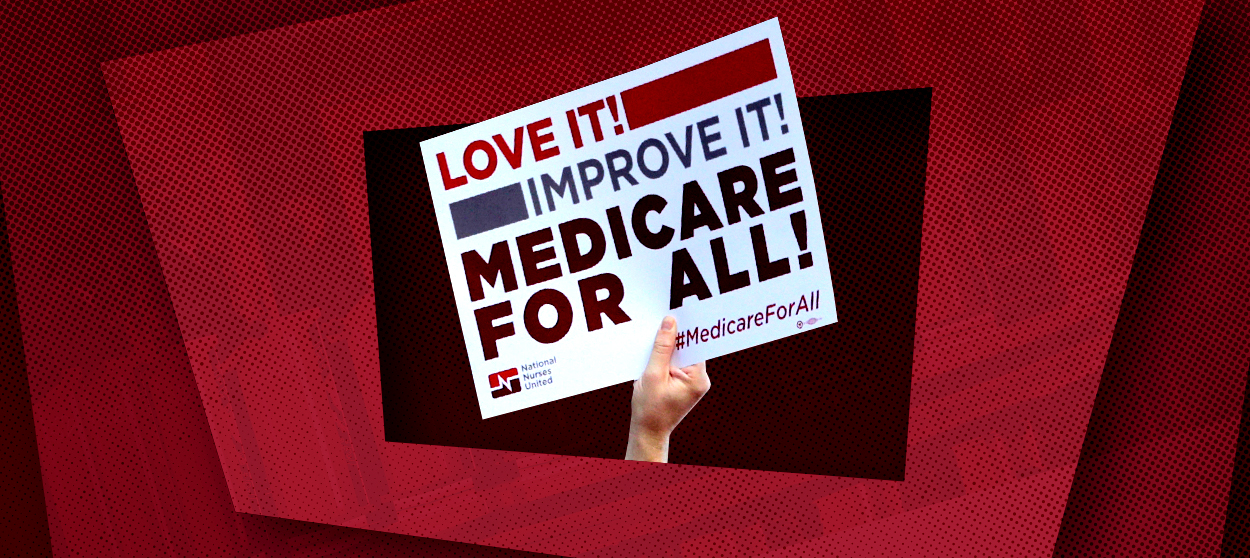No one really wants to ban all private insurance. Not even Bernie Sanders.
In an effort to prove how uncompromising they are, Democrats have fallen for an idiotic gotcha question


A free daily email with the biggest news stories of the day – and the best features from TheWeek.com
You are now subscribed
Your newsletter sign-up was successful
Are some of the top Democratic presidential contenders determined to stamp out private health-care coverage?
At both of last week's debates, moderators pressed the candidates to raise their hands if they would "abolish [Americans'] private health insurance in favor of a government-run plan?" Sens. Kamala Harris, Elizabeth Warren, and Bernie Sanders, along with New York City Mayor Bill de Blasio, all did so. Center-right pundits promptly howled that the Democrats were rendering themselves unelectable. Center-left journalist Jonathan Chait worried that Warren "may have just filmed the most effective attack ad against herself." Harris almost immediately started telling TV shows she had misunderstood the question.
It was an entirely silly and needless kerfuffle, because this is a silly and needless debate.
The Week
Escape your echo chamber. Get the facts behind the news, plus analysis from multiple perspectives.

Sign up for The Week's Free Newsletters
From our morning news briefing to a weekly Good News Newsletter, get the best of The Week delivered directly to your inbox.
From our morning news briefing to a weekly Good News Newsletter, get the best of The Week delivered directly to your inbox.
Let's start with what policies the Democrats are actually proposing. Sanders has already released a Medicare-for-all bill, which would basically have the government provide health insurance coverage for all Americans, the same way Medicare already provides coverage to retirees. Warren and Harris both say they support Sanders' bill, and point to it as an example of their ideal health-care policy.
But here's the thing: Sanders' Medicare-for-all bill doesn't ban private health insurance. What it does ban is any private health coverage that duplicates the coverage offered by the government. For example, if Sanders Medicare-for-all system covered hospital stays but not dental work, then private insurers would still be free to offer plans that cover dental needs. In fact, Medicare already bans any private insurers from offering the same coverage it offers. Canada's single-payer system does this too.
Why ban duplicative coverage? Because, while the government covers everyone (That's the point!), private insurers can limit their customer pool by charging high premiums. Which could also allow them to reimburse health-care providers at a higher rate than the government. If your doctor accepts both your government coverage and another patient's private coverage, they might privilege the other patient or move them to the front of the line because their coverage gives a more generous reimbursement. It's basically a question of how high a priority you put on fairness in your health-care system. And different countries with single-payer systems have decided this issue differently.
The point is, there's a perfectly logical reason for the ban, and it's hardly unusual. More to the point, the policy still allows for supplemental private coverage — plans that cover the things the government plan doesn't.
A free daily email with the biggest news stories of the day – and the best features from TheWeek.com
This is also where the issue gets a little sticky.
Sanders' plan may allow private insurers to cover things the government doesn't, but under Sanders' plan, the government would also cover a ton. "It would cover hospital visits, primary care, medical devices, lab services, maternity care, and prescription drugs as well as vision and dental benefits," Sarah Kliff pointed out at Vox. "The plan is significantly more generous than the single-payer plans run by America's peer countries. The Canadian health-care system, for example, does not cover vision or dental care, prescription drugs, rehabilitative services, or home health services."
In other words, while Sanders' plan doesn’t ban supplementary coverage from private insurers, it does offer such generous coverage by the government that there's not much room left for private coverage to fill any gaps. This is the logic upon which both conservative critics — and supposedly nonpartisan mainstream reporters and pundits — hang the logic that Sanders' plan would "ban" private coverage. It's a dramatic "gotcha" question, and last week wasn't the first time presidential candidates like Harris have been tripped up by it.
But it's also fundamentally obscurantist, because it confuses two distinct policy questions: Should the government ban duplicative coverage? And, how generous should the government's own coverage offering be? Answers might vary, but those are the real points of contention in the health-care debate.
Still, even if "Would you ban private insurance?" is a dumb question, politicians also have an obligation to not fall into the trap. There can be a tendency among left-wing politicians and activists to embrace the silly caricatures foisted on them by these sorts of "gotcha" questions: Instead of picking apart the question itself, just raise your hand in the affirmative to show how uncompromising you are. That seems to be what Sanders, Warren, Harris, and de Blasio were going for last week. And as understandable as their instinct was, it still wasn't wise to take the bait.
A recent Morning Consult poll found that support for Medicare-for-all does indeed fall if it "diminishes the role of private insurers." But it more than recovers if the diminishment "allows you to keep your doctor and hospital." Americans, it seems, bear no love for private insurers. They simply don't want the daily rhythm of their own lives — the doctors they see and the local providers they trust — upended by a transition to Medicare-for-all. Which makes perfect sense.
Voters are capable of processing nuance. Reporters, debate moderators, and politicians should be too.
Jeff Spross was the economics and business correspondent at TheWeek.com. He was previously a reporter at ThinkProgress.
